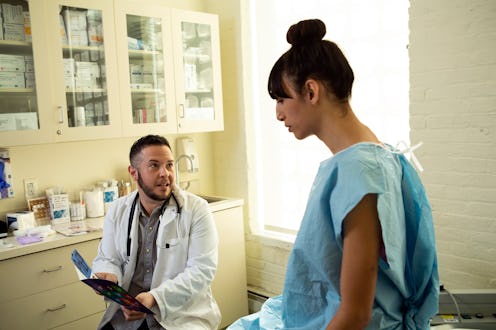Life
Coming Out To Your Doctor Is Hard, But Helpful. 2 People Who’ve Done It Explain.
Coming out is rarely, if ever, an easy endeavor. When conversations about gender, names, and pronouns come up with your doctor, though, it can be even scarier to talk about. One study published in the Journal of Adolescent Health found that just under half of transgender and nonbinary youth intentionally avoided coming out to their doctors. But people who've gone through the process say that coming out to your doctor as trans or nonbinary is essential to getting the care you deserve.
"When I moved to a new city and needed to find a new primary care doctor, I specifically looked for doctor's offices that were trans-friendly," says Jaime, 27. They tell Bustle that it was nonetheless terrifying coming out as nonbinary to their doctor, who was kind but clearly didn't know what to do. Even though Jaime was only there for an annual check-up, her doctor "offered to connect me to an endocrinologist in case I wanted to go on hormones, which was sweet, but also kind of the only thing she knew to offer."
For Devin, 22, telling his primary care physician that he was trans masculine was the first step towards transitioning medically, which not everyone wants or needs to do. Because gender-affirming treatment often requires letters from therapists, Devin came out to his therapist for the same reason. "She was amazing about it," he says. "Talking to her helped me feel comfortable enough to come out to my parents."
"I'd been with my therapist for five years before I came out as nonbinary to myself," Jaime tells Bustle. "Telling him took a lot of tears and false starts, and unfortunately I had to educate him about some things. But putting in the work was worth it for me." They say they still haven't come out to their psychiatrist of a year. "She's generally very affirming and I'm sure it would be fine, but it still feels impossible, especially as more time goes by."
For medical providers who may not have much to do with your gender-related care, like dentists or optometrists, Devin says coming out right away is a good way to avoid being misgendered. Going to the doctor already makes people feel vulnerable, Devin explains, and coming out can help give you the peace of mind that you hopefully won't be misgendered. If you don't feel up to coming out, Jaime says, you don't even have to explain your gender to your dentist — you can just ask the receptionist to update your file to include your correct name.
It's important to do as much online research or networking as you can in advance to try and make sure that your doctor is trans-friendly. OutCare Health and Trans in the South are two resources that can help. Even if you know for a fact that you doctor is knowledgeable and affirming, though, be gentle with yourself if it's still hard to come out. Some people pencil it in on their intake form (if a place for "trans" or "nonbinary" isn't on the gender or sex field, I will often write it in), and others practice a script for themselves before an appointment to help the words come out easier. If your doctor misgenders you or suggests that your identity isn't valid, Jaime says, find another one. Whatever you do to help yourself come out to your doctor, remember that your gender is valid and you deserve quality, affirming medical care.
Study Cited
Transgender Youth's Disclosure of Gender Identity to Providers Outside of Specialized Gender Centers. Sequeira, Gina M. et al. Journal of Adolescent Health, Volume 0, Issue 0 https://doi.org/10.1016/j.jadohealth.2019.12.010
This article was originally published on
